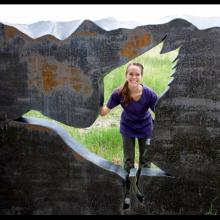Sabine Laguë
Why did you decide to pursue a graduate degree?
I am inquisitive and love learning. I thrive in environments where I am encouraged to explore potential, envision ways to address a question, and employ a variety of skills to accomplish a task. Graduate school offered me the opportunity to thoroughly explore a research topic about which I was passionate while also honing skills I desired to grow in, be it research, teaching, writing, networking, presenting, or communicating.
Why did you decide to study at UBC?
I decided to study at UBC because of the world-class caliber of its comparative physiology group, which has proved invaluable for collaboration and discussion, and my lab's research. Since hearing about the high altitude migration of bar-headed geese as an undergraduate I was fascinated by the topic. My lab was appealing because of its significant contribution to bar-headed goose research, and its local and international collaborators who have since helped make my research project possible.
What was the best surprise about UBC or life in Vancouver?
The best surprise about graduate life was the way in which I was encouraged to broaden the way I approached and thought about scientific research. Professors and students in my field are open to conversation and collaboration. Consequently, my research has benefited not only from dialogue with UBC colleagues, but also from conducting scientific research with collaborators in Tibet, Peru, and Brazil. These global experiences have significantly shaped the way I think as a scientist.
What do you hope to accomplish with your research?
Through this research I hope to characterize cardiovascular low oxygen tolerance in bar-headed geese and related waterfowl, providing greater insight into the physiology facilitating high altitude migration. This research will inform our clinical understanding of cardiovascular low oxygen tolerance and high altitude athletic training. Understanding limits to high altitude performance will also inform conservation ecology policy makers about how physiology limits species range and habitat selection - a critical topic in a globally changing climate.
What has winning a major award meant to you?
Winning these awards has not only encouraged me about the importance and promise of my research, but it has also affirmed my pursuit of graduate studies as an individual with a wide array of interests both within and outside of the sciences. This support enables me to focus on my research and attend relevant international conferences. It has also encouraged me about UBC and the Canadian government’s desire to support students and fund basic research.
What advice do you have for new graduate students?
UBC and Vancouver have a lot to offer - please take the time to be involved in something on a regular basis that gives you life and isn't related to your thesis! Surround yourself with a supportive community. These things will give you a better work-life balance and help you to enjoy and more fully experience all aspects of your time at UBC.

